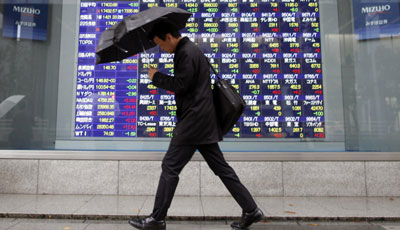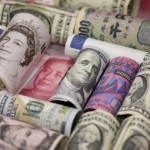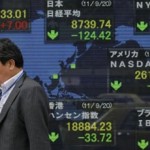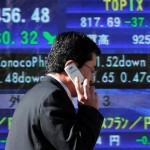Asian Stocks Fall on U.S. Rate Outlook, Samsung as Pound Jumps

-
Sterling snaps drop with Parliament to discuss Brexit plan
-
Oil below $51 amid doubts over Russia’s stance on OPEC deal
Asia stocks dropped for a fourth day as investors fretted about the prospect of U.S. interest-rate hikes and Samsung Electronics Co. extended its slump. Oil held losses on concern Russia isn’t fully committed to an OPEC deal to curb oil output, while the pound rallied.
The MSCI Asia Pacific Index retreated to a three-week low. Samsung headed for its steepest three-day loss in five years after scrapping its troubled flagship smartphone. Sterling rebounded 1.5 percent against the greenback after Prime Minister Theresa May accepted that Parliament should be allowed to vote on her plan for pulling the U.K. out of the European Union. The Bloomberg Dollar Spot Index slipped from its highest level since July as the Aussie strengthened. U.S. crude traded below $51 a barrel.
Investors will scrutinize minutes from the Federal Reserve’s latest decision due Wednesday, with odds of a U.S. rate increase by year-end climbing to 67 percent amid speculation the recent surge in oil prices will fuel inflation. Alcoa Inc. has brought the health of corporate America into focus after disappointing results. May’s decision to give lawmakers a say over Brexit is calming investors after they dumped the pound on concern she was taking a hardline approach to the negotiations.
“Stock markets are becoming nervous about the prospect of rising interest rates against a background of moderate profit growth and relatively high valuations,” Ric Spooner, chief market analyst in Sydney at CMC Markets, said in an e-mail. “Given how critical the interest-rate outlook is at the moment, markets will be focused on the degree of support for a rate hike this year revealed in the Fed minutes.”

Stocks
The MSCI Asia Pacific Index dropped 0.5 percent as of 1:43 p.m. Tokyo time, with raw energy producers and property stocks driving declines. After losses in the U.S. and Europe Tuesday, MSCI’s All-Country World Index headed for its lowest close since Sept. 16.
Hong Kong’s Hang Seng Index declined 1.1 percent in a third day of losses as Bank of China Ltd. and Bank of Communications Co. sank more than 2.5 percent. The Shanghai Composite Index declined 0.3 percent.
In Japan, the Topix lost 0.7 percent. Australia’s S&P/ASX 200 Index dropped 0.2 percent. The Philippine benchmark index retreated for a sixth day, while Thailand’s SET Index declined 1.5 percent.
The Kospi index swung between gains and losses in Seoul as Samsung — the gauge’s biggest stock and the fourth-largest by weighting on MSCI’s Asia-Pacific measure — tumbled 1.6 percent, bringing its three-day rout to 11 percent.
Futures on the S&P 500 Index added 0.1 percent after the underlying benchmark dropped 1.2 percent to a one-month low on Tuesday. Alcoa tumbled the most since 2009 after its earnings trailed analysts’ estimates and the aluminum maker cut forecasts for its jet-part business.
“Investors will focus on corporate earnings and the outlook provided by companies over the next six weeks as the Fed also prepares the market for what looks to be a likely interest-rate hike in December,” James Woods, a global investment analyst in Sydney at Rivkin Securities, said in an e-mail. Coupled with the looming U.S. presidential election and Brexit concerns, “all of this provides multiple factors that have the ability to increase volatility over the coming months,” he said.
FTSE 100 Index futures in the U.K. rose 0.1 percent.
Currencies
The pound climbed to $1.2306 from near a three-decade low. Parliament will debate on Wednesday a motion from the opposition Labour Party calling for a “full and transparent debate on the government’s plan for leaving the EU” and for lawmakers to be able to “properly scrutinize that plan” before she begins formal talks. In response, May tabled an amendment that effectively accepted the motion, adding that there shouldn’t be an attempt to block Brexit or “undermine the negotiating position of the government.”
“Given how aggressively short the pound the market was positioned, the prospect of U.K. parliament at least discussing the downside of a ‘hard Brexit’ has encouraged substantial profit-taking on those positions,” said Sean Callow, a senior strategist at Westpac Banking Corp. in Sydney.
The Aussie and the Kiwi strengthened at least 0.3 percent, while South Africa’s rand climbed 0.4 percent after sinking 3.9 percent on Tuesday.
The Bloomberg Dollar Spot Index, a gauge of the greenback against 10 major peers, fell for the first time in three sessions, declining 0.2 percent Wednesday. The yen was little changed at 103.50 per dollar.
China’s central bank weakened the yuan’s reference rate for a sixth day, the longest run of cuts in nine months, amid speculation policy makers will allow further declines as the dollar rises. The currency was little changed at a six-year low.
Commodities
West Texas Intermediate crude added 0.3 percent to $50.92 a barrel after slipping 1.1 percent last session.
Russia’s largest oil producer, Rosneft PJSC, said it it won’t cut output, according to Reuters, after President Vladimir Putin said earlier this week that his nation would join the Organization of Petroleum Exporting Countries in freezing or cutting supplies. Russia and the producers’ group are due to meet inIstanbul Wednesday to discuss an output pact. Supply and demand will come back into balance earlier than expected if OPEC’s accord to trim output is implemented, the International Energy Agency said.
Gold for immediate delivery gained 0.3 percent to $1,256.69 an ounce following a 0.5 percent drop last session, its ninth decline in 12 days.
Industrial metals advanced. Zinc rallied 0.6 percent after sliding the most in 10 months, while copper added 0.4 percent on the London Metal Exchange.
Bonds
Australian government debt extended declines, with 10-year yields rising for a seventh straight day, adding three basis points, or 0.03 percentage point, to 2.28 percent.
Similar maturity Treasury notes yielded 1.77 percent, little changed following a five basis-point jump last session.
U.S. securities due in 10 years or more have lost 5.8 percent in the three months through Monday, the most among 144 government bond indexes tracked by Bloomberg and the European Federation of Financial Analysts Societies.
Source: Bloomberg





























